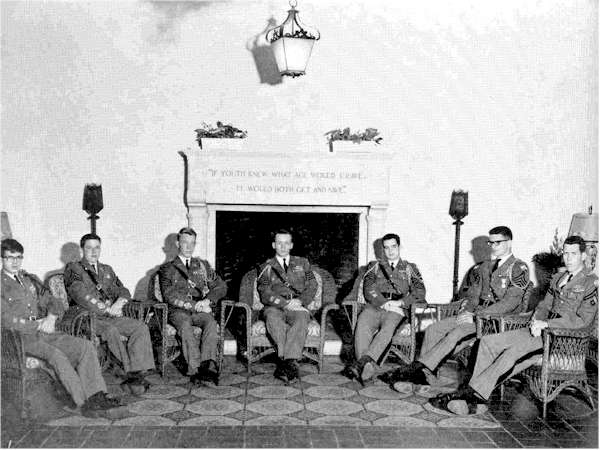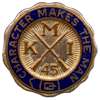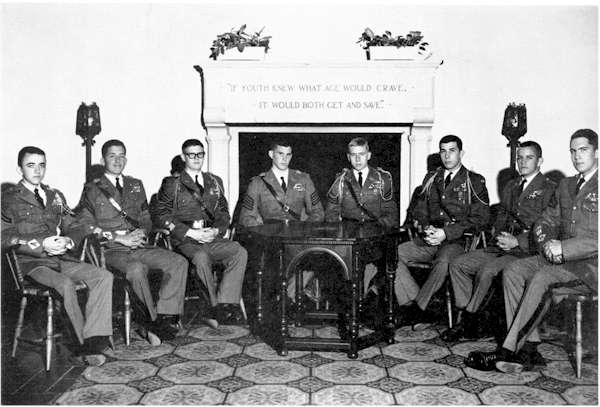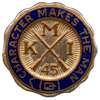

| "On my honor as a K.
M. I. cadet, I have not given nor received aid on this examination." |
I have no
idea as to
the beginning of the honor code. It was in place when I got there
in January of 1942. While I was there, the notation:
We would sign that statement on our tests. To my knowledge the honor system was just part of the "Character makes the Man" motto. The Kentucky Country Day publication (distributed) at the reunion (part of which displayed below) talked about the honor code that my son, Jim, put in place in 1984 at KCD. This was copied from KMI as I interpreted it to him. The "KMI Tradition" was that the Student Council ruled on issues of violations instead of the administration. Bernie, KMI '46 |

- 1963 Student Honor Council -
"The prophetic mantel in the Venice building."
|
IT WOULD BOTH GET AND SAVE [Inscribed on the Venice building mantel.] |
 Part of an article by Jim Dahlem, KCD '84 (Kentucky Country Day School, "Connections", Winter 2003, p 24) ......Bernie Dahlem KMI '46, echoes many of these sentiments. "The motto at KMI was 'Character makes the man,"' he recalls, "which was an interesting concept to a bunch of 12-13 year-old boys who wanted to be men. It gets everybody thinking, 'Well I want to be a man, so I better get me some of that.' [Laughs] If you talk to anybody that went to KMI, you'll find that they all have their own definition of character, because they've done a whole lot of thinking about it. The best definition I've found is by Thomas Babbington Macaulay, and it's hanging on the wall at the office: 'The measure of a man's true character is what he would do if he knew he would never be found out.'That's mine, but I've found in talking to other people who went to KMI that when I spit out my definition, they spit out their own. Everyone has their own definition, but they're all in the same vein about telling the truth, having honor, and doing what you say you're going to do." Bernie remembers KMI as a place where honor and accountability had become an integral part of the student culture. "It was just a way of life. You never saw anybody cheating. The teacher would pass out an exam and walk out of the room. There was a statement on the bottom that we would sign that said 'I have neither given or received any help on this exam.' If someone was caught cheating, they were put on report, and they would get 25 penalty tours-that means 25 hours walking the beat. [Laughs] That's a long time." According to Bernie Dahlem, cadets at KMI were inspired by the example of the school's leadership. "The honor of the cadets was very important to Colonel Richmond and to Major Hodgin both," he recalls. "Colonel Richmond was the President and CEO of the school, and Major Hodgin was the Commandant. This was the guy you really didn't want to get called in front of. If you got called into Major Hodgin's office, you knew that something very, very serious was going on. He could sit there with a sober face - the best poker face you'd ever want to see - and if you deserved it, he read you the riot act, but he had a reputation among the guys of being fair. "Colonel Richmond and Major Hodgin had both been teachers, and when KMI came up for sale in 1925, they pooled their resources and bought it. it was an entrepreneurship situation, but they founded it on this idea of 'Character makes the man.' We had chapel every Tuesday morning before class, and there was another chapel service on Sunday, where preachers from different denominations came to speak to us. It was very much in the vein of doing what was honorable and what was right-that was part of the culture. "I thought it was wonderful when Jim wanted to introduce an honor code at KCD. To me, there's no better way to run a school than the way KMI ran it." According to Jim, the honor code is an essential part of KCD's mission to educate the whole person. "As you become an adult," he states, "you find that your word is your honor and your word is your bond. As you enter the work world, that becomes very important, because it's all you have-your reputation is all you have. The time to instill these values is when you're in high school, because it provides a foundation for everything that you go on to do." Bernie Dahlem agrees. "I think it's important to raise kids that can look somebody in the eye, say 'I'll do this,' and then go do it. If you want to educate somebody to be a whole man and to do business the way you should do business - in an honorable fashion - then you need a code of conduct and a set of values." For Bernie, the KMI honor code fostered a way of life and a way of doing business that he's very proud of. As he built the Dahlem Company into a successful and diverse venture encompassing construction, property management, and real estate, Bernie Dahlem has always let his word be his bond. "People knew that if we would shake hands on a contract," he recalled, "we would go ahead and do what we'd agreed on the strength of that handshake. I've designed and built buildings on a handshake - one that comes to mind is the bottling house out at YeIlowstone distilleries. The first piece of paper between us was my bill to them, and the second piece was their check to me. It's a nice way to do business." |

- 1962 Student Council -
 |
Kentucky
Military Institute www.kmialumni.org Send e-mail to: kmimail@kmialumni.org Copyright © All rights reserved. |
 |